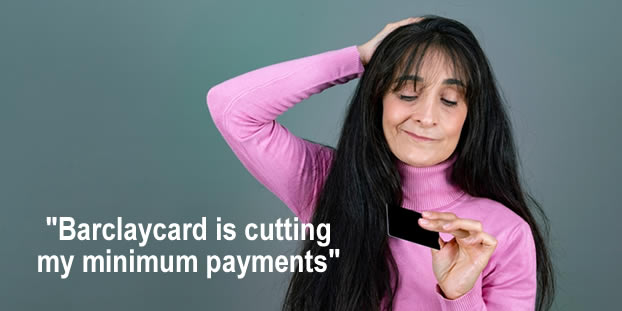 In April 2024, Barclaycard has told many customers that it will be setting lower minimum payments on their accounts from July.
In April 2024, Barclaycard has told many customers that it will be setting lower minimum payments on their accounts from July.
From a poll I ran on Instagram, Barclaycard has informed about 90% of cardholders. It looks as though this change is going to be across the board, affecting everyone. The messages are going out by email, letter or text. Look out for the communication if you haven’t yet heard.
Contents
This is just 3 years after they raised minimums a lot
Before 2021, Barclaycard calculated everyone’s minimum payments in the same way. But in January 2021, they started “personalising” this. Everyone paid more, but some people paid a lot more.
The rules introduced in 2021 were that you will have to pay the higher of three numbers as your minimum:
- between 2 and 5% of your balance;
- between 1 and 3% of your balance, plus any interest, default fees or account maintenance;
- £5, or the total outstanding balance of an account if it is less than £5.
I asked a lot of people how this affected them. The lowest increase I found was about 20% and the highest 60%. And the people with the highest interest rate on their card were the ones that were hit with the larger increases.
The most common percentages were 3.75% of the balance or 2.5% of the balance plus the interest.
Now in 2024, minimum payments have been slashed
The new Barclaycard minimum payment rules are it chooses the largest of:
- 1% of the balance (this applies if you have a 0% balance transfer);
- 1% of the balance plus the amount of interest being charged (this applies if you are paying interest); and
- £5 (this applies if you have a small balance).
The changes I have seen are reducing these to 1% of the balance or 1% of the balance plus the interest.
This may sound like good news…
Barclaycard says “we are making the changes to give you greater flexibility each month”.
Flexibility is one of the big advantages of credit cards – you can pay more in a good month and less in a difficult month, unlike a loan. If you only pay the minimum amounts occasionally, then this is very useful,
It is true that by reducing the minimum payments, Barclaycard is increasing this flexibility.
But millions of people only make the minimum payments on their credit cards, often setting up a direct debit to pay this amount each month. This can result in very long times to clear a balance. And cutting the minimums will prolong the time people are in debt and increase the interest they pay.
You will pay a LOT more interest if you only pay the new lower minimums
Take a balance of £5,000 on a Barclaycard at 24% interest, where you only make the minimum payments and don’t spend on the card.
Under the old “2.5% of the balance plus the interest charged” rule, it would take just over 14 years to clear the card balance. And you would pay about £3,500 in interest.
14 years probably sounds too long. But with the new “1% of the balance plus the interest charged” calculation, it will take more than 30 years to clear the balance. And you would pay £8,500 in interest.
That sounds bad … is it even legal?
Yes it is legal – 1% plus interest is the bare minimum a credit card lender can charge, see the FCA’s rule CONC 6.7.5.
But at this level of minimum payment, a customer who pays the minimum for 18 months is going to start getting “persistent credit card debt” letters from Barclaycard. And Barclaycard will have to take action to help them after 3 years of paying the minimums.
Up until now, Barclaycard’s old minimum payment rules meant that few customers would come under the persistent credit card debt rules. But now it is possible that a lot may by the end of 2025.
How to avoid this extra interest
Barclaycard suggests that if you don’t like the change, you can reject it and stay on the old rules by closing the card.
That will only work if you are happy not to use the card again… and if you are there, there is a much better way!
You can simply set up a fixed direct debit amount in the app that is equal to your current minimum payment. By fixing the payment like this, the balance will be cleared in a lot fewer years and you will pay less interest then making the old minimum payments. Which is probably why Barclaycard didn’t suggest it as an option!
If you are still spending on the card, you can also do this, but you have to be careful if your balance has gone up a lot in case your fixed amount is less than the required minimum and you need to pay more. Check your statements each month. This isn’t ideal but it will work.
You will also clear a lot less of a 0% balance transfer
Barclaycard is offering 28 months 0% balance transfers. A great way to clear debt much more cheaply.
But many people just pay the minimum, happy that at least all their payment is clearing debt, not paying interest.
Under the old minimum rule of 3.75% of the balance, at the end of 28 months paying only the minimum, you would have cleared nearly two-thirds of the amount transferred.
Under the new minimum payment of just 1%, you will have cleared less than a quarter. If you can’t manage to get another 0% transfer, you may then be in difficulty when interest is added.
To avoid this problem, you should set up a direct debit for monthly amount that is as large as you can afford. You can do this in the app. Ideally you would take the amount you transfer and divide it by 28 (or the number of months you get, if that is less) and then pay that amount each month. But fixing any amount will help – and the larger the better.
Has Barclaycard been clear in its communications?
I don’t think it has.
Barclaycard says in the information about minimum payment calculations changing that “Paying more than the minimum can help you save interest“.
But it hasn’t been explicit that because it is reducing the minimums, this means that you will be paying more interest if you pay the minimums. It showed how much your minimum payments might drop, but didn’t mention how much longer it would take to repay the debt at this lower rate.
I have asked several people if Barclaycard warned them that the changes would cost more in interest. They all said variations on “no mention of it costing more.”
And even if someone did realise they would pay more, the change in percentages sounds small. I don’t think many would expect it to take twice as long to repay a balance, or cost more than twice as much, under the new rules.
A breach of the Consumer Duty?
Although Barclaycard is presenting the change as giving customers more flexibility, it is also a move that will generate a lot of extra profit for Barclaycard.
I don’t think most customers reading the information from Barclaycard will realise the full effect of what sounds like a minor change. I think Barclaycard should have known this and been clearer in its communications.
Also it isn’t clear that decreasing the minimum payments is contributing to what the regulator calls “a good customer journey”. Moving from a situation where Barclaycard had few or no customers in persistent credit card debt to one where many may fall into this by the end of 2025 seems like a retrograde step.
A lot of people when presented with the facts about the lower minimums, might want to remain on the old calculations if they could.
But Barclaycard has not provided any simple way for a customer to routinely make higher minimum payments if they want to, except by closing the card. It is possible to set a fixed payment amount to be collected by direct debit in the app, but that doesn’t work well if the card is being used for spending.


Tony Starkey says
People should spend only the money that they have and should never borrow and pay interest except in order to buy their house or apartment. In other words live within your means.
Sara (Debt Camel) says
In an ideal world, that would be great. But people in a less than ideal situation also need to know how to improve it.
Colin Weeden says
Thank you for those words of wisdom. Unfortunately there are a lot of people who don’t live in an ideal world.
Barrie Goddard says
We are getting further and further down the road of the financial companies putting more and more people in very serious debt more than we have ever seen .
The debt owed by most people is growing at an alarming rate someone has to step in and stop all the credit card loan companies forever lending money at absorbent interest rates just been offered one pay a sum each month plus interest at 84% where you can never get out of debt . Do not lend money to people who cannot ever pay it back just to earn more interest.
Its like giving a child ice cream after ice cream and then wondering why they are sick
The financial world run countries and peoples lives and it needs to stop they have far to much control over peoples lives
Banks are no longer just banks they are multi billion pound companies having their fingers into to many pies.
They do not have there customers interest at heart
They just want the interest
Puzzled says
Are your numbers correct? If you pay 1% on a balance transfer for 28 months that is 28% not 24%?
Sara (Debt Camel) says
This happens because the 1% is of the current balance, which has dropped 1% from the month before’s payment. So every month the minimum payment drops a bit. This is “the minimum payment trap” that keeps people in credit card debt for so long. You escape the trap by making larger than the minimum payments.
Terry Turner says
Yes its correct as you pay 1% of the decreasing debt so 28 payments wouldn’t add up to 28% nearer 24%.
Freeda Hussain says
Hi, Im of the opinion that constantly pursuing creditors or acting as an advocates for clients may not be sustainable. I believe that a more effective approach to breaking this cycle is to focus on educating clients and equipping them with money management skills and knowledge. This empowers them to make informed decisions and live within their means if possible, ultimately avoiding exposure to higher rates of interest and creating more competition for creditors to offer cheaper alternatives.
Sara (Debt Camel) says
Better financial education is also good. But people already in difficulty need good advice on how to improve their situation.
Rachel says
I think it’s a difficult balance. Where possible, people need to make payments more than the minimum, but with budgets squeezed as they are right now and credit card debt at the level it is, a 3% minimum payment could be utterly unaffordable and pushing people further into debt. At 3.75% on a £5000 debt, that’s £187.50 in the first month, compared with £50 if it’s at 1%. That’s a massive difference, and will likely help a lot of people to both meet their immediate needs and avoid missed payment fees. Yes, it’s the right thing to do to help people clear their debts faster in the longer term, but not if that means making things worse right now.
Sara (Debt Camel) says
yes flexibilty can help – if things are going to improve shortly. It’s useful only having to pay he small minimum at times. But Barclaycard hasn’t provided a way for someone to choose to easily pay a larger minimum by setting a higher direct debit. And that traps many people who see “the minimum” as the recommendation of what they should pay.
Chris Bowser says
Of course people will write here ‘you should only spend what you can afford etc.etc.etc.’ But our society forces people to take out debt.
You want to be a student, take out a loan, You want a car, at £20,000 for a base Ford Fiesta, good luck buying that without a loan.
This change by Barclaycard is the worst kind of cynical behaviour ‘we’ve given you more flexibility’ should read ‘We’ve got more flexibility to keep you in debt for longer and make more money from you’
Perhaps the solution is to change the minimum payment to 10%, in this way people would really feel spending £5,000 as they would be hit for £500 a month
Howard Gardner says
I agree with Chris Bowser (= Barclays want to keep you in debt for longer, to ramp up their profits). I still think the solution is flexible repayments – more in the months you can afford higher amounts – as well as a DD.
Meanwhile we will be reducing our Barclaycard down to £1, keeping it open for buying plane tickets etc. Not bothered if it annoys Barclays computers or top executives!
Marie Davis says
I received a text on the 8th of May with a reminder that barclays would be closing my Barclaycard account on the 10th of May, I submitted an unaffordibility lending complaint I think in October last year due to being allowed a 2nd card with the 1st having been in persistent debt due to a gambling addiction and subsequently using £500 of my £800 credit limit on the 2nd (I have since had a gambling block put on all my devices) the 1st was in my previous married name (hadnt realised as all correspondence was in app and i thought when i changed my bank accout details it was included) but all other personal information was the same, address, DOB and bank account, . I received a letter from Barclaycard accepting no liability because a) my complaint re 1st card was after the 6 year cut off although I only finished paying the card off last year and b) because i applied for the 2nd card with a different surname my initial credit card account ‘went under the radar’ when checks were made and only 1 card is allowed per customer, they instantly closed my 1st c/c with an in app message stating ‘upon your request (i did not request) we are closing your account and also put a stop on my 2nd card with available to spend £0 despite having credit… I didnt follow up with FOS because I had thrown the rejection letter away.. I still feel I had a valid claim and I’m angry with myself for allowing Barclays to brush me off (well, thats what it feels like)?
Sara (Debt Camel) says
what was the date of the rejection letter? You have 6 months from that to send the complaint to the ombudsman.
You don’t have to clear the account straight away, you can carry on repaying it
Laura says
Hi
Sorry if it has been asked before , will this come in to affect for credit card cardholders of tesco bank when they complete the sale ?
Thanks
Laura
Sara (Debt Camel) says
Barclays has said it will continue to use the existing Tesco brand, but whether it decides to bring T&Cs on cards into line at some point, no one knows.